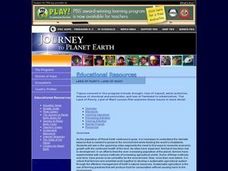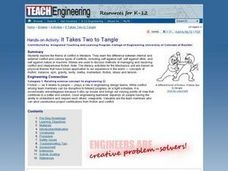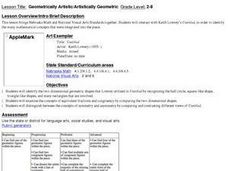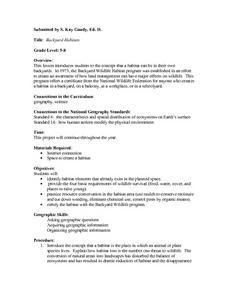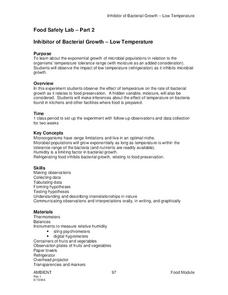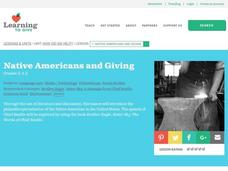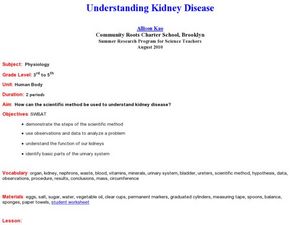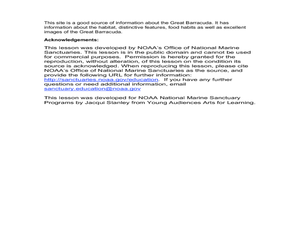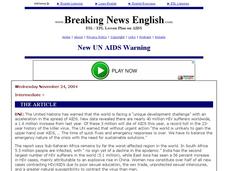Curated OER
Land of Plenty, Land of Want
Students view a video about the state of the environment. They discover the topic of sustainable agriculture. They identify problems and how to solve them.
Curated OER
It Takes Two To Tangle
Students utilize strategies to comprehend literature. They write stories with diverse vocablulary that incorporate the difference between internal and external conflict. They make sure that the stories use methods of managing and...
Curated OER
Fast Cars and Roll-Over
Learners creat a ramp using cardboard and tape. They follow directions to perform an experiment to determine the degree of tilt needed to cause an empty milk carton to tip over. Students discuss their results in terms of center of gravity.
Curated OER
Helping Those In Trouble
Students explore the importance of helping others. After reading a story about being helpful, students discuss times when they assisted others and then sing a song. In groups, students mime situations where they portray a good...
Curated OER
Physical Science: Magnetism and Electricity
Learners use a variety of objects to test for ability to "stick" to a magnet. They perform an experiment to see that electricity in circuits can produce light, heat, sound, and magnetic effects. They discover magnets attract and repel...
Curated OER
Water Cycle
Ninth graders explore ways water moves through various reservoirs on Earth, examine how human activities change water cycle, investigate substances present in water that indicate human activity, and discuss how understanding water cycle...
Curated OER
"Garden Springs Gardeners"
First graders ponder the question of how plants help their lives. They observe and compare properties of several different plants. Differentiate between living organisms and nonliving objects.
Curated OER
Geometrically Artistic/Artistically Geomtric
Students identify the two-dimensional geometric shapes Lowrey utilized in the painting Untitled. Students compare the two-dimensional shapes in terms of equivalent fractions, congruency, symmetry and asymmetry. Students create their own...
Curated OER
Acids and Bases: Together again!
Learners identify principles behind acid-base reactions. They predict factors that may affect an acid-base reaction. Students identify questions and concepts that guide scientific investigations.
Curated OER
Backyard Habitats
Students identify habitat elements. They create a habitat in a backyard, on a balcony, at a workplace, or in a schoolyard and provide the four basic requirements of wildlife survival (food, water, cover, and places to raise young). They...
Curated OER
Fossil Fuels (III), The Geology of Coal: Interpreting Geologic History
Students hypothesize about why various samples of coal have different characteristics. Pupils use information that they found during Internet searches to ascertain the validity of their hypotheses and verify the "story" of coal. ...
Curated OER
What A Gas!
Students study various aspects of air. In this science lesson plan, students discover that air occupies space, understand the visual effects of air, and explain how air exerts force.
Curated OER
Food Safety Lab
Students use the scientific method to investigate the role of temperature in microbial growth. In this food preservation lesson, students set up an experiment with fruit in room temperature and in a refrigerator. They record the...
Curated OER
Native Americans and Giving
Students explore the concept of philanthropy. In this Brother Eagle, Sister Sky: The Words of Chief Seattle lesson, students examine the plight of Native Americans and explore Native Americans' quest for the "common good."
Curated OER
Olympic Emblems
Students study the history of Olympic emblems. In this Olympics lesson, students examine the Olympic designs and symbols used to represent different Olympic game years. Students then collaborate to create Olympic emblems for a particular...
Curated OER
How the Court Became Supreme
High schoolers investigate how the Supreme Court changed under the leadership of John Marshall. In this Supreme Court instructional activity, students recognize the role of the Supreme Court as well as the significance of Marbury v....
Curated OER
"Web of Life" Game
Students relate members of an ecosystem by their interactions. For this ecosystem lesson, students toss a ball to other members of their group (each representing a member of an ecosystem) and tell how they are related to that member....
Facing History and Ourselves
Who Are We?
Sixth graders explore the diversity of communities. In this community-building lesson, 6th graders compose biopoems and create a classroom exhibit entitled "Who am I? Who are We?"
Curated OER
Web of Life Game: Trout
Students explore the concept of food webs. In this food web lesson, students demonstarte the connection between species. Students use a ball of string show how the food web works, then have a class discussion.
Curated OER
Apple Estimation: Percentages & Subjective Reasoning
Students practice using their estimation skills by utilizing apples. In this percentage lesson plan, students utilize a scale and an apple to discover the percentage of each bite they take. Students share their data with the rest of...
Curated OER
Understanding Kidney Disease
Students experiment to determine information about kidney function. In this kidney function lesson plan, students use the scientific method to experiment with eggs, water, salt, sugar, and vegetable oil to simulate kidney function. They...
Curated OER
The Great Barracuda
Students explore oceanography by researching the great barracuda. For this animal life lesson, students read several vocabulary terms dealing with ocean life and examine a drawing of a barracuda. Students examine the many...
Curated OER
Acid Rain
In this acid rain learning exercise students complete a series of questions on acidity and how acid rain forms. Students view a slide show and list what they can do to help.
Curated OER
Breaking News English - New UN AIDS Warning
In this ESL/ELL reading and grammar instructional activity, students read an article entitled, " New UN AIDS Warning" from 2004. They complete abbreviation activities, fill in the blanks, discussions, true/false, and phrase match...


